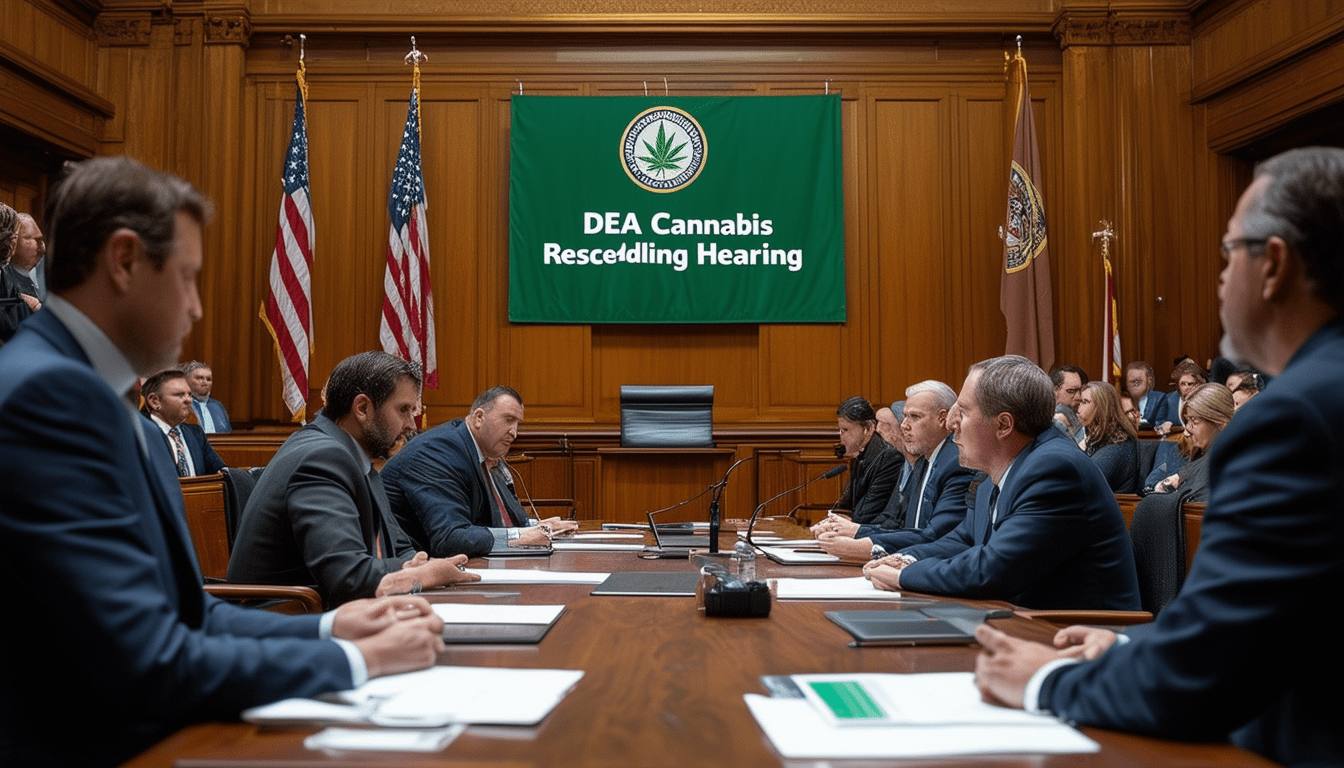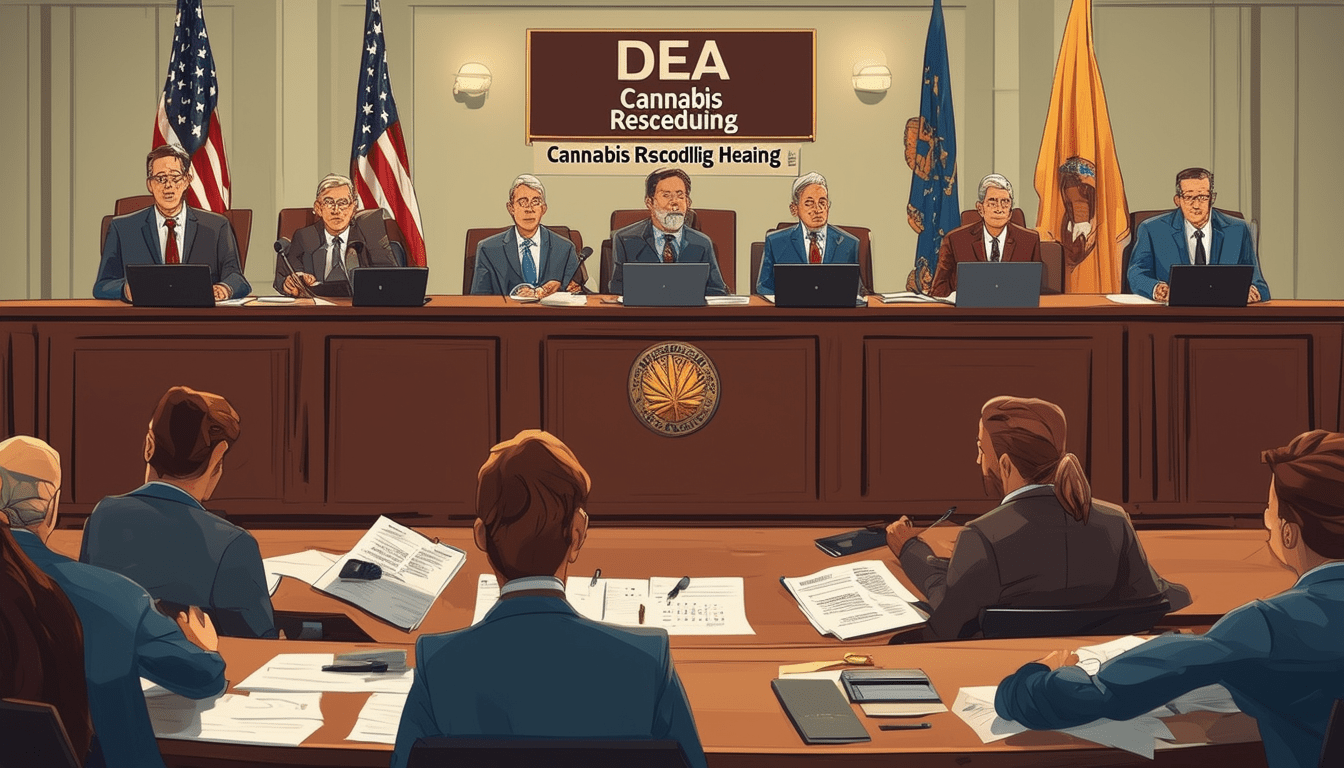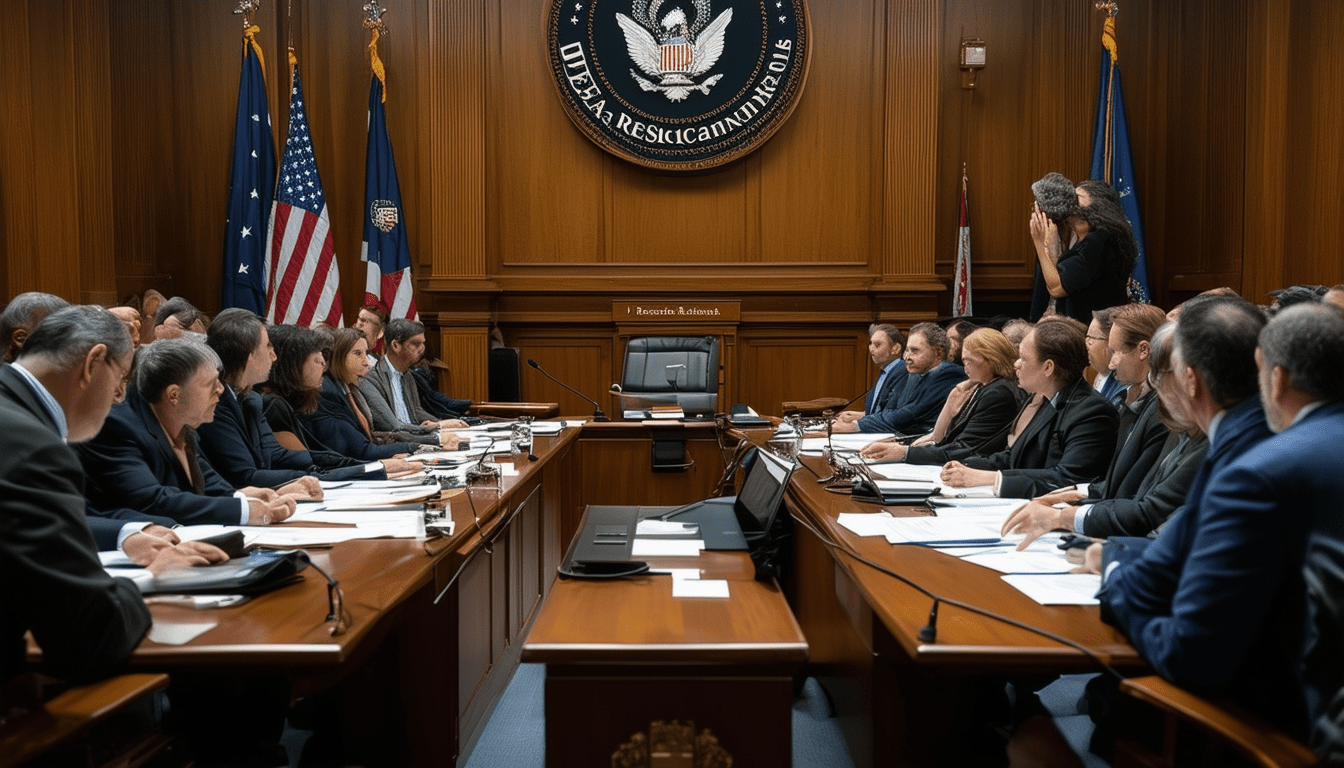DEA Initiates Witness Selection for Cannabis Rescheduling Hearing, Engaging Both Industry Experts and Prohibition Advocates to Share Their Perspectives
|
IN BRIEF
|
The Drug Enforcement Administration (DEA) has kicked off the selection process for witnesses as it prepares for a significant hearing regarding the federal rescheduling of marijuana planned for December. This pivotal event arises in the wake of the Justice Department’s proposal to move cannabis from Schedule I to Schedule III of the Controlled Substances Act. In a move to ensure a well-rounded discussion, the DEA is inviting a diverse range of voices, including representatives from the cannabis industry, drug testing organizations, and advocacy groups opposing legalization. This hearing not only aims to gather expert insights but also to reflect the multitude of perspectives on the evolving landscape of cannabis legislation.

The Drug Enforcement Administration (DEA) has recently initiated the selection of witnesses for a highly anticipated hearing regarding the rescheduling of cannabis. Set against the backdrop of the Biden administration’s proposal, this hearing aims to gather diverse viewpoints from both industry experts and prohibition advocates. As the DEA prepares to gather expert testimonies, the implications of this hearing could potentially reshape the future of cannabis legislation in the United States.
Purpose of the Hearing
The upcoming hearing is centered around the proposal to reclassify marijuana from its current designation as a Schedule I substance under the Controlled Substances Act (CSA) to Schedule III. This shift, proposed approximately seven months ago by the Justice Department following a comprehensive scientific review, has garnered substantial public interest both from the cannabis industry and anti-cannabis groups. The March official proposal came after an extensive public comment period, indicating a significant level of engagement from the community regarding cannabis policy and its impacts.
Witness Selection Process
With only a month remaining until the scheduled hearing on December 2, the DEA has commenced notifying the selected witnesses. Several organizations representing both ends of the cannabis spectrum have been invited to participate. This includes influential bodies such as the National Cannabis Industry Association (NCIA), which advocates for the cannabis business sector, alongside well-known prohibitionist groups like Smart Approaches to Marijuana (SAM) and the Community Anti-Drug Coalitions of America (CADCA).
Perspectives from Industry Experts
The NCIA, having received confirmation of their participation, has expressed enthusiasm about representing the interests of independent cannabis businesses. Executive Director Aaron Smith emphasized that cannabis should not remain classified as Schedule I due to the overwhelming evidence highlighting its medical benefits and lower abuse potential compared to substances currently listed in the same schedule. Smith asserts that while moving to Schedule III is a pragmatic step, there must be guidelines established for federal agencies to ensure that state-licensed businesses can operate without federal interference.
Viewpoints from Prohibition Advocates
On the other side of the debate, representatives from anti-cannabis organizations such as SAM and the National Drug & Alcohol Screening Association (NDASA) are equally prepared to present their concerns regarding cannabis rescheduling. These groups argue that the potential shift from Schedule I to Schedule III could lead to an increase in cannabis use, which they believe poses risks to public health and safety. Their testimony will likely reflect apprehensions about how changes in the federal classification of cannabis might influence state policies and societal norms surrounding drug use.
Concerns About the Regulatory Process
Despite the anticipation surrounding the hearing, uncertainty looms about the timeline for potential rescheduling. There are fears that the additional step of holding this administrative hearing could delay the final rulemaking process, potentially pushing any decisions past January. This creates a scenario where changes in administration following the November elections could alter the course of cannabis policy moving forward.
The Role of Federal Bureaucracy
Amidst these discussions, Vice President Kamala Harris has indicated that one of the hurdles in the rescheduling process has been federal bureaucracy, which she claims has been a reason for the delays observed in cannabis reform initiatives. Harris has previously voiced her desire for a more expedited process in handling marijuana rescheduling, emphasizing the need for a swift conclusion to the review that led to the DOJ’s proposal.
Implications for Cannabis Legislation
The DEA’s decision to hold a hearing reflects the significance of this topic in the public discourse on drug policy reform. With both supporters and opponents actively engaged in the discussion, the outcome of the hearing and the subsequent ruling could have lasting effects on how cannabis is viewed and regulated at a federal level. The need for a balanced representation of perspectives during this hearing emphasizes the complexity of cannabis reform and its implications for public health, safety, and economic opportunity.
Comparison of Perspectives on DEA Cannabis Rescheduling Hearing
| Perspective | Comments |
| Industry Experts | Advocate for rescheduling to Schedule III, highlighting medical efficacy and reduced abuse potential. |
| Prohibition Advocates | Express concerns about health risks and potential increases in cannabis use among youth. |
| DEA Position | Emphasizes the need for additional evidence and cautious review before making changes. |
| Public Health Officials | Support for careful regulatory frameworks to ensure safety and oversight of cannabis products. |
| Political Climate | Both Democratic and Republican leaders show varying levels of support, complicating the process. |
| Small Business Impact | Industry representatives stress the importance of maintaining state-level business operations during transition. |
| Research Community | Calls for more comprehensive studies on the benefits and risks associated with cannabis use. |
| Public Opinion | Shifting attitudes toward legalization, with increasing support for cannabis reform among voters. |

DEA Initiates Witness Selection for Cannabis Rescheduling Hearing
The Drug Enforcement Administration (DEA) is moving forward with selecting witnesses for an important hearing related to the potential rescheduling of marijuana. This hearing is expected to bring together a diverse group of individuals, including both industry experts and prohibition advocates, to present their views on the proposed changes. Scheduled for December, this event aims to gather comprehensive input before the administration finalizes its decision.
Background on Cannabis Rescheduling Proposal
In March, the Department of Justice (DOJ) proposed a recommendation to shift cannabis from Schedule I to Schedule III under the Controlled Substances Act (CSA). This recommendation followed a scientific review and a public comment period that generated tens of thousands of responses. The upcoming hearing will serve as an opportunity for the DEA to further assess these perspectives and enrich the discussion surrounding marijuana’s legal status.
Selecting Diverse Witnesses
As the date approaches, the DEA has begun notifying several parties of their selection to participate. This includes representatives from key organizations, such as the National Cannabis Industry Association (NCIA), which advocates for the interests of cannabis businesses, as well as various prohibitionist groups. This mix of attendees is essential to ensure a balanced discussion that reflects the diverse opinions on cannabis regulation.
Expert Input from Industry Representatives
Notable industry figures like Aaron Smith, executive director of NCIA, have expressed their enthusiasm about being included in the discussion. He emphasized the importance of ensuring that the voices of independent small businesses are heard during the hearing. Industry proponents argue that cannabis does not belong in Schedule I due to its established medical efficacy and lower potential for abuse, advocating for a progressive step forward in federal cannabis policy.
Prohibitionists Weigh In
In contrast, prohibition advocates are also gearing up to share their critiques regarding cannabis rescheduling. Organizations such as Smart Approaches to Marijuana (SAM) and Community Anti-Drug Coalitions of America (CADCA) aim to present arguments highlighted by their longstanding concerns over public health and safety, thereby ensuring that potential risks remain central in the policy debate.
The Role of the DEA and Future Implications
The DEA has made clear that additional information is essential on various topics affecting the scientific review that prompted the rescheduling recommendation. The outcome of this hearing could have significant ramifications not only for the cannabis industry but also for federal and state regulations moving forward. The tension surrounding the unsolved status of cannabis as a Schedule I substance has raised questions about how any changes might alter existing legal frameworks.
Final Thoughts on Upcoming Hearing
The decision to hold an administrative hearing instead of moving directly to final rulemaking signals the importance of public discourse on such a pivotal issue. The DEA’s approach reflects the careful examination necessary for carefully maneuvering through the complexities of cannabis legislation—a topic of increasing relevance in today’s society.
Key Points on DEA’s Witness Selection for Cannabis Rescheduling Hearing
- Hearing Date: Scheduled for December 2
- Rescheduling Proposal: Moving cannabis from Schedule I to Schedule III
- Witness Selection: Involves industry representatives and prohibition advocates
- Organizational Participants: Includes National Cannabis Industry Association and anti-cannabis groups
- Public Input: Over 40,000 comments received during the public comment period
- Expert Testimonies: Aimed at evaluating the scientific review of cannabis
- Potential Delays: Hearing may impact the rescheduling timeline due to administrative processes
- DEA’s Perspective: Seeks additional information before finalizing the rescheduling
Overview of DEA’s Witness Selection for Cannabis Hearing
The Drug Enforcement Administration (DEA) has commenced the selection of witnesses for an upcoming hearing concerning the proposed rescheduling of marijuana. This initiative is significant as it marks a potential shift in cannabis regulation amidst an evolving national conversation surrounding its legal status. With scheduled hearings on December 2, stakeholders from various backgrounds, including industry experts and advocates for prohibition, will have the opportunity to voice their opinions on the rescheduling from Schedule I to Schedule III of the Controlled Substances Act.
Importance of Diverse Perspectives
The selection of witnesses demonstrates the DEA’s effort to incorporate a range of views into the decision-making process. It is essential to recognize that the perspectives of both industry advocates and prohibition supporters contribute to a more comprehensive understanding of the implications of cannabis rescheduling. Engaging different stakeholders allows the agency to evaluate scientific data, public health concerns, and socioeconomic impacts associated with the cannabis industry versus potential risks surrounding marijuana use.
Industry Advocates’ Arguments
Industry representatives, such as those from the National Cannabis Industry Association (NCIA), emphasize the medical benefits of cannabis and advocate its reclassification. With substantial evidence showing marijuana’s efficacy in treating various medical conditions, proponents argue that its current Schedule I status unjustly categorizes it alongside dangerous drugs with high abuse potential. By moving cannabis to Schedule III, companies can better operate under state regulations without the looming threat of federal overreach.
Prohibition Advocates’ Concerns
Conversely, those in favor of prohibition raise concerns regarding the societal implications of cannabis rescheduling. They often cite potential increases in substance abuse, youth exposure, and the lack of comprehensive studies proving the long-term effects of cannabis use. Prohibition advocates argue that while some individuals may benefit from medical cannabis, rescheduling could inadvertently promote broader access, leading to higher consumption rates and health consequences for vulnerable populations.
Scientific Review Findings
The backdrop for this hearing includes a recent review conducted by the Department of Justice, which concluded that marijuana might not warrant its restrictive Schedule I classification. However, further scrutiny remains necessary. The DEA has made it clear that they seek additional input regarding the scientific findings presented during this review, indicating ongoing skepticism towards cannabis. Before finalizing any decision, the agency must gather all relevant data to formulate an informed action plan that balances industry growth with public safety.
Impact of the Hearing on Future Legislation
The upcoming hearing not only impacts the immediate consideration of rescheduling but also sets a precedent for future legislation affecting cannabis policy. It emphasizes the importance of a transparent democratic process, allowing for public engagement as society grapples with evolving views on cannabis usage. As the hearing approaches, it is crucial that all parties involved articulate their positions clearly and substantively, ensuring that their viewpoints contribute to a well-rounded discussion on marijuana’s place in law.
The Path Forward
Ultimately, the engagement of industry experts and prohibition advocates in this hearing underscores a vital moment for cannabis regulation in the United States. While discussions will undoubtedly be spirited and passionate, the focus should remain on fostering a productive dialogue that leads to practical solutions. Moving forward, it will be essential for both sides to find common ground and work collaboratively towards frameworks that address health, safety, and economic opportunity associated with cannabis use.
Frequently Asked Questions
What is the purpose of the DEA hearing? The hearing aims to gather expert input on the Biden administration’s proposal to move marijuana from Schedule I to Schedule III under the Controlled Substances Act.
When is the hearing scheduled to take place? The hearing is set for December 2.
Why was there a need for witness selection for the hearing? The selection of witnesses is necessary to ensure a diverse range of perspectives are heard, including those from the cannabis industry and prohibition advocates.
Who has been selected as witnesses for the hearing? Witnesses include representatives from the National Cannabis Industry Association, various drug testing associations, and prohibitionist groups.
What does the National Cannabis Industry Association hope to communicate at the hearing? They wish to emphasize the significance of independent small businesses in the cannabis industry and argue against marijuana’s classification as a Schedule I substance.
What implications does the proposed rescheduling have for state-licensed cannabis businesses? The rescheduling to Schedule III would ideally provide regulatory guidance that helps state-licensed businesses operate without federal interference.
Is there any uncertainty surrounding the timeline for rescheduling? Yes, there are concerns that the hearing may delay the rulemaking process, particularly with a potential administrative change after the upcoming November election.
What has the Vice President commented regarding the delays in rescheduling marijuana? Vice President Kamala Harris has attributed the delays to federal bureaucracy, calling for an expedited process in rescheduling marijuana.





Post Comment